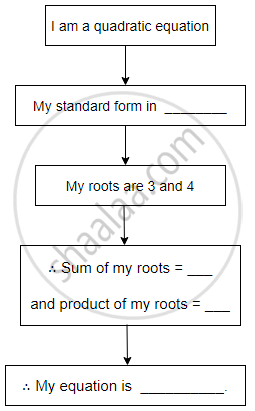Advertisements
Advertisements
प्रश्न
Find the value of k for which the quadratic equation kx (x − 2) + 6 = 0 has two equal roots.
उत्तर
Given quadratic equation is:
kx( x − 2 )+ 6 = 0
⇒ kx2 − 2kx + 6 = 0
For a quadratic equation to have equal roots,
b2 − 4ac = 0
Comparing the given equation with general equation ax2 + bx + c =0
We get a = k, b = −2k and c = 6
(−2k)2 − 4(k)(6) = 0
⇒ 4k2 − 24k = 0
⇒ 4k ( k − 6 ) = 0
Therefore, k = 0 and k = 6.
APPEARS IN
संबंधित प्रश्न
If the product of the roots of the equation `x^2-3x+k=10` is-2 then the value of k is
(a) -2 (b) -8 (c) 8 (d) 12
The roots of the equation 2x^2-6x+7=0 are
(a) real, unequal and rational (b) real, unequal and irrational (c) real and equal (d) imaginary
If the roots of the quadratic equation `px(x-2)+=0` are equal, find the value of p.
Solve `3x^2+5sqrt5x-10=0`
Write any two quadratic equations.
Decide whether the following equation is quadratic equation or not.
\[x + \frac{1}{x} = - 2\]
Ranjana wants to distribute 540 oranges among some students. If 30 students were more each would get 3 oranges less. Find the number of students.
Complete the following activity to form a quadratic equation.
Activity:

A boat goes 30 km upstream and 44 km downstream in 10 hours. In 13 hours, it can go 40 km upstream and 55 km downstream. Determine the speed of the stream and that of the boat in still water.
If 460 is divided by a natural number, then quotient is 2 more than nine times the divisor and remainder is 5. Find the quotient and divisor.
